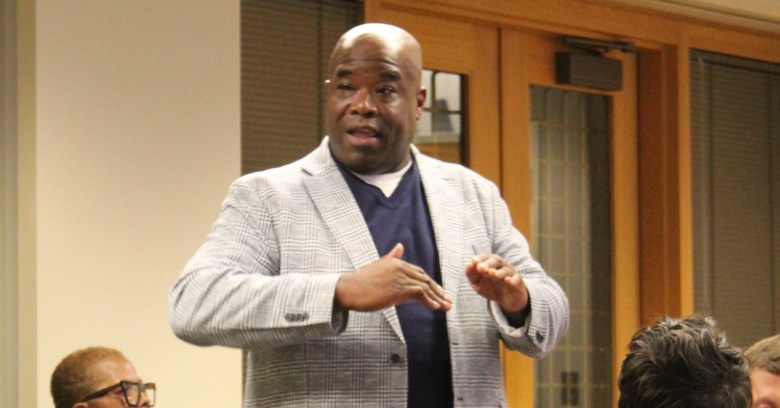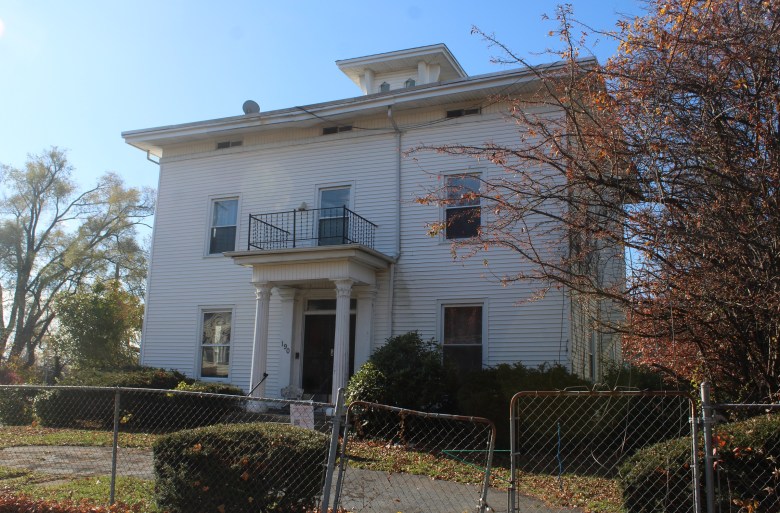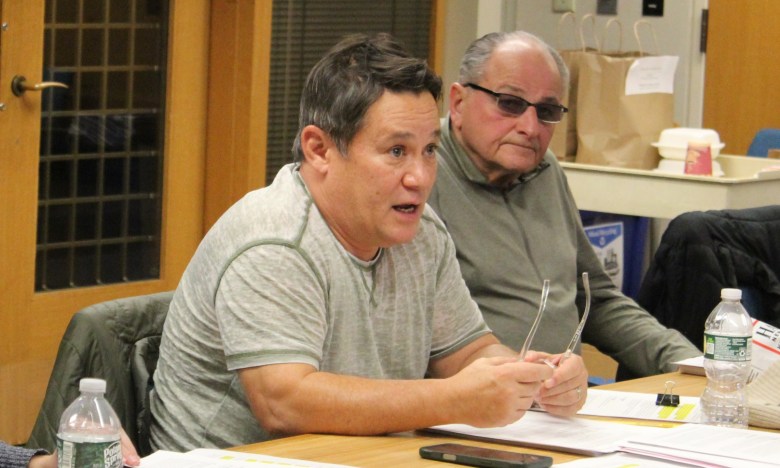 Willie Hayes: “I can tell you where every single person is at any given moment. They have to personally communicate with me or other house managers.”
Willie Hayes: “I can tell you where every single person is at any given moment. They have to personally communicate with me or other house managers.”
 The current sober house at 190 Winthrop. Credit: Thomas Breen photo
The current sober house at 190 Winthrop. Credit: Thomas Breen photo
A proposal to begin providing on-site mental health and substance abuse treatment to residents of a sober home sparked a passionate debate among neighbors over whether the change would make the West River neighborhood more or less safe.
The debate over safety and property values came up Tuesday night during a Board of Zoning Appeals (BZA) meeting, when representatives of Prosperity House, a nonprofit that supports people recovering from addiction, presented their proposal for the single-family house at 190 Winthrop Ave.
On the second floor of City Hall, Karen Tyson, the founder of Prosperity, and Imani Knight, a case manager, spent an hour advocating for a special exception to turn their Winthrop sober house into an American Society of Addiction Medicine (ASAM) Level 3.1 residential facility for 12 adult men. The home currently houses 14 men.
A sober house is an alcohol- and drug-free residence that offers a structured, supportive environment for people recovering from addiction. As per state guidelines, sober homes don’t provide “formal substance use disorder treatment services.” Sober homes are not certified by any state agency, though the state Department of Mental Health and Addiction Services (DMHAS) compiles a list of open beds in homes approved by groups like the National Alliance for Recovery Residences (NARR).
According to that list, as of Nov. 18, Prosperity has three open beds across its five houses in New Haven.
Unlike sober houses, Level 3.1 residential facilities provide low-intensity clinical treatment and are regulated by the state Department of Public Health. The programs offer “24-hour direct care and deliver low-intensity services,” aimed at helping residents learn “personal responsibility” and reintegrate “into the network systems of work, education, and family life.”
State guidelines mandate that Level 3.1 facilities are staffed 24 hours per day, offer at least five hours of recovery services per week, and provide psychiatric assistance to residents, either on site or via telemedicine.
The people admitted must have a “moderate or severe substance use disorder” and may have a “co-occurring” mental health diagnosis.
Currently, there are no Level 3.1 programs in the Greater New Haven area.
In a phone interview with the Independent on Wednesday, Tyson said the 3.1 designation would bring “no changes to what we do at all” at 190 Winthrop. Prosperity’s five houses, she noted, already offer more “structure” and “accountability” than most sober homes, including a requirement that residents receive treatment during their stay.
The 3.1 designation would primarily allow residents to access more clinical services, such as therapy, on site. Tyson said Prosperity Counseling, a partner organization to Prosperity House, already provides those services to residents at Winthrop, which is why she expects the day-to-day operations to remain largely the same.
Because the Winthrop home serves people early in their recovery process, Tyson argued that having more services in-house could help prevent relapse by smoothing the transition between in-patient treatment and independent living.
In addition, said Tyson, most insurers allow residents of a 3.1 facility to extend their stay for up to six months, whereas coverage for sober homes is typically capped at three months.
State data show that 48 people have overdosed in New Haven so far this year.
In an email sent on Friday, Nov. 14, Board of Alders President Tyisha Walker-Myers, whose ward includes 190 Winthrop Ave., told Knight that she would “not be opposing your application.” She said she lives on Winthrop Avenue and hasn’t “had a problem with 190 Winthrop Ave.”
During Tuesday’s BZA meeting, Knight said, “Our mission is to provide structured, clinically supervised, and compassionate housing for individuals in recovery who are integrating into the community.” She requested the “reasonable accommodation” of a special exception under the Fair Housing Act, Americans with Disabilities Act, and Connecticut General Statutes.
According to Knight, there have been zero complaints about 190 Winthrop Ave. since the home was opened in 2014. All 14 of the current residents would quality for the 3.1 facility, she added, as they all have moderate or severe substance use disorders and mental health diagnoses.
Walter Teague, a Winthrop homeowner and local bishop, was the first neighbor to speak in opposition.
“No one’s denying the need for the service,” said Teague. “It’s not the service, it’s the where.”
He commended Tyson for doing “a phenomenal job with the sober house,” describing all the current residents as “very respectful.” But, he warned, a Level 3.1 facility would be a “whole different dynamic,” as it’ll include people who need clinical treatment for mental health issues.
“If they’re off their meds, you don’t know” what’s gonna happen, said Teague. “And that’s just the facts.”
Cheryl Jackson, another Winthrop homeowner, also commended the sober home. She then echoed Teague’s fear of living next door to people with mental health diagnoses.
“I don’t want to be a neighbor to that,” said Jackson, worrying that people “off [their] meds” will harm kids on Winthrop.
Willie Hayes, an operations manager for Prosperity House, responded by describing the safety rules already in place or planned for the facility.
He said residents would continue to be subject to quiet hours and a curfew from 9 p.m. to 6 a.m, and they would still not be allowed to host visitors. The home will also have two staff members on site 24/7, as well as an on-call clinician for conflict resolution.
They’ll also put all medication into a secure room that only staff can access.
“The reason why you feel safe in the environment? Because any time anyone leaves that property, we know where they’re at,” said Hayes. “I can tell you where every single person is at any given moment. They have to personally communicate with me or other house managers.”
Knight added that future residents will still have to submit to a biopsychosocial screening, which involves a rigorous review of their clinical, legal, and medical histories. She said the home wouldn’t admit anyone convicted of violent or sexual offenses, and would turn away people with mental health disorders severe enough to prevent them from being “self sufficient.”
She also said that people who relapse or violate a rule will be referred to a facility that offers a higher level of care.
Nearly anyone with a substance use disorder has a mental health diagnosis, argued Tyson. “Nothing’s going to change” in terms of who lives in the home.
Later in the night, Knight said, “I feel less safe walking down to the corner of George and Winthrop,” where there’s people with “needles in their arms” or even “murders,” compared to “standing on the corner of 190 Winthrop Avenue.”
“You can’t not tell the truth,” exclaimed Teague. When city staff asked him not to interrupt others’ statements, he left the room.
Homeowners also opposed the facility out of concern for their property values.
One resident, who identified herself as P.T., asked, “What about the value of all of our homes that are in the community? Has that been taken into consideration?”
Before he left, Teague agreed, saying, “Raise your hand if you’re someone who wants to buy my house when I have two sober houses and a possibility of, now, a mental health facility.”
William Mathis, a local pastor, responded by arguing that the facility has reduced crime and improved the neighborhood’s overall livability.
“The situation” around substance abuse “has turned around,” said Mathis. “When a service is provided immediately within the community as opposed just to scattering them, there is transformation.”
Tyson pointed out that Prosperity has developed a relationship with law enforcement, reducing the overall incidence of crime on Winthrop. “Crime is what determines property values,” she said on Wednesday.
Richard, a former client of Prosperity, reminded the BZA on Tuesday that “mental health and addiction is not a moral defect.” He said the house “saved” his life, as well as the lives of his loved ones and his community more broadly.
“Proper housing is not a reward,” said Richard. “It’s a foundation for people to succeed.”
BZA was required to refer the matter to the City Plan Commission (CPC), so the board didn’t make a final decision on the request.
Tyson told the Independent on Wednesday that she’ll host a community meeting with neighbors and Walker-Myers to clarify what “mental health” really means.
 Mike Martinez, chair of the Board of Zoning Appeals, referred the application to the City Plan Commission.
Mike Martinez, chair of the Board of Zoning Appeals, referred the application to the City Plan Commission.
Related
